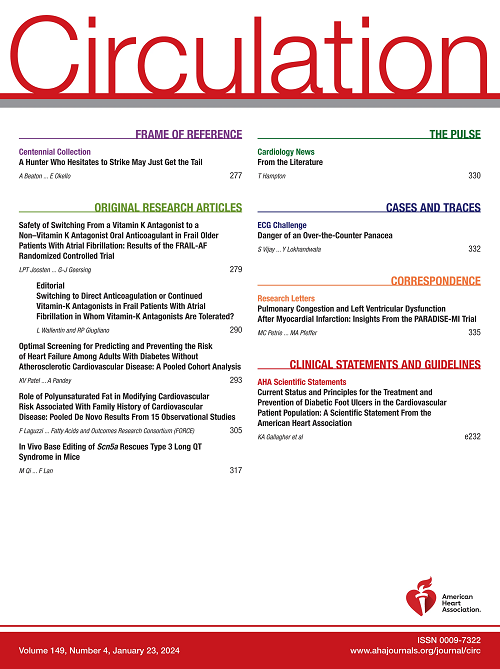Intensive Lowering of LDL Cholesterol Levels With Evolocumab in Autoimmune or Inflammatory Diseases: An Analysis of the FOURIER Trial.
IF 35.5
1区 医学
Q1 CARDIAC & CARDIOVASCULAR SYSTEMS
引用次数: 0
Abstract
BACKGROUND Patients with an autoimmune or inflammatory disease (AIID) are at increased cardiovascular risk and may benefit more from statin therapy. In the FOURIER trial (Further Cardiovascular Outcomes Research with PCSK9 Inhibition in Subjects with Elevated Risk), the PCSK9 (proprotein convertase subtilisin/kexin type 9) inhibitor evolocumab lowered low-density lipoprotein cholesterol levels, but not hsCRP (high-sensitivity C-reactive protein) levels, and reduced the risk of cardiovascular events. METHODS FOURIER was a randomized trial of evolocumab versus placebo in 27 564 patients with stable atherosclerosis who were taking statins. This analysis focused on the effect of evolocumab in patients with or without an AIID, defined as any autoimmune or chronic inflammatory condition. The primary end point was a composite of cardiovascular death, myocardial infarction, stroke, unstable angina, or coronary revascularization. RESULTS At baseline, 889 patients (3.2%) had an AIID, most commonly rheumatoid arthritis (33.7%) or psoriasis (15.6%). Median (interquartile range) low-density lipoprotein cholesterol levels were 90.0 mg/dL (79.5-105.5) and 91.5 mg/dL (79.5-108.5) in patients with or without an AIID, respectively (P=0.025), and the placebo-adjusted percent reduction with evolocumab was consistent (60.2% versus 59.0%; P=0.57). Baseline hsCRP was higher in patients with an AIID (median 2.1 versus 1.7 mg/L; P<0.001) and did not significantly change with evolocumab in either group. Compared with placebo, evolocumab reduced the rate of the primary end point by 14% in patients without an AIID (hazard ratio, 0.86 [95% CI, 0.80-0.93]) and by 42% in patients with an AIID (hazard ratio, 0.58 [95% CI, 0.38-0.89]; Pinteraction=0.066). Likewise, evolocumab reduced the key secondary end point of cardiovascular death, myocardial infarction, or stroke by 19% in patients without an AIID (hazard ratio, 0.81 [95% CI, 0.74-0.89]) and 58% in those with an AIID (hazard ratio, 0.42 [95% CI, 0.24-0.74]; Pinteraction=0.022). CONCLUSIONS Intensive lowering of low-density lipoprotein cholesterol levels with evolocumab may lead to greater relative reduction in cardiovascular events in patients with an AIID. REGISTRATION URL: https://www.clinicaltrials.gov; Unique identifier: NCT01764633.求助全文
约1分钟内获得全文
求助全文
来源期刊

Circulation
医学-外周血管病
CiteScore
45.70
自引率
2.10%
发文量
1473
审稿时长
2 months
期刊介绍:
Circulation is a platform that publishes a diverse range of content related to cardiovascular health and disease. This includes original research manuscripts, review articles, and other contributions spanning observational studies, clinical trials, epidemiology, health services, outcomes studies, and advancements in basic and translational research. The journal serves as a vital resource for professionals and researchers in the field of cardiovascular health, providing a comprehensive platform for disseminating knowledge and fostering advancements in the understanding and management of cardiovascular issues.
 求助内容:
求助内容: 应助结果提醒方式:
应助结果提醒方式:


